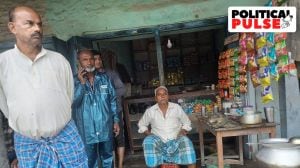Son up for London award, father fights back his tears
On Monday evening, in London’s City Hall, Satyendra Dubey will come to life—if only for an evening. That’s when his nominatio...

On Monday evening, in London’s City Hall, Satyendra Dubey will come to life—if only for an evening. That’s when his nomination is announced for the prestigious Whistleblower of the Year Award instituted by Index on Censorship, an international magazine devoted to protecting and promoting free expression.
For Bageshwari Dubey, his grieving father in Siwan, what matters is that ‘‘this year only one of my sons came home for Holi.’’ And the unending wait for his killers to be booked.
The IIT engineer who was shot in Gaya after he complained of alleged corruption in the National Highway project became a household name for courage under fire after The Sunday Express first exposed the letter he wrote. And followed it up with an investigative series that led to the Prime Minister’s assurance that the guilty will be brought to justice ‘‘wherever they are.’’
Dubey has been nominated along with UK’s Iraq whistleblower Katharine Gun, an Uzbek mother fighting her son’s torture and a Ukrainian officer who challenged his government. Dubey is the only posthumous nominee.
‘‘The world perhaps now knows about the good work my son did,’’ says Bageshwari Dubey, ‘‘but the world must also know that you can’t kill an honest man and get away. Why haven’t the culprits been caught yet?’’
That’s a question for the CBI which has few answers. The key witness in the case, the rickshaw-puller who saw Dubey being killed, has gone missing after being questioned by the agency. And two others interrogated were found dead from poisoning.
‘‘In our lives happy days are over,’’ says the father. ‘‘The only peace of mind I yearn for is the hope that killers of my son will be punished.’’ For the family, time hasn’t been the healer yet. ‘‘Even if for a few hours, Satyendra would travel all the way to be with us for a festival. This year, only one of my sons came home for Holi, and it broke my heart,’’ says Bagheshwari Dubey.
Says Dhananjay, Satyendra’s younger brother: ‘‘He never sought recognition for his work and that way, recognition is less relevant. He just wanted to do it honestly. I only wish someone had listened to him while he was alive. He had to pay with his life before being noticed.’’
The family is trying and trying very hard to put life back on track but for mother Phulmati Devi, it is harder. She still walks as if in a daze. Memories stalk her, but regrets don’t haunt. No regrets at all for having told Dubey to speak the truth—and nothing but.
She doesn’t want to speak, the father breaks the silence. ‘‘That is the basic thing I told my children. Be truthful, the rest of the values of life flow from it.’’
The one consolation has been the huge public outcry over his death—The Indian Express series of stories galvanised a global campaign, PILs have been filed in both the High Court and the Supreme Court and last week the apex court issued notices to the Centre, state and the CBI on evolving a mechanism to protect whistleblowers.
‘‘It gives me a sense of satisfaction that there more people and institutions who are willing to take the risk and stand up for the truth,’’ says the father. And on Monday evening, in London, a million miles from where he sits, there will be many who will agree.



- 01
- 02
- 03
- 04
- 05




























